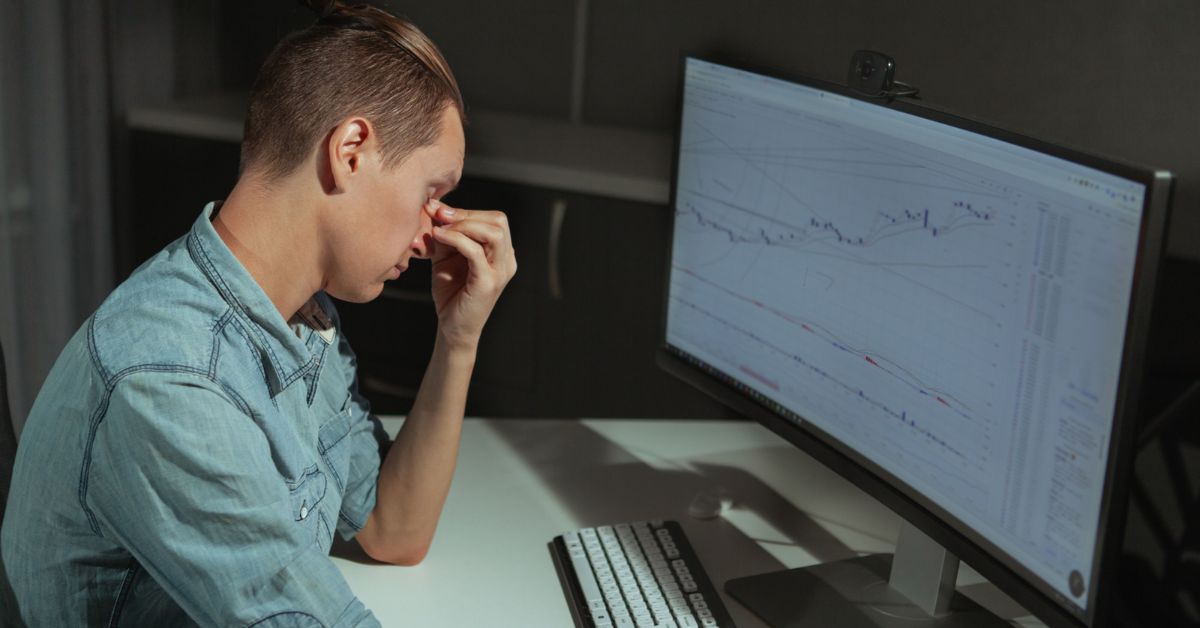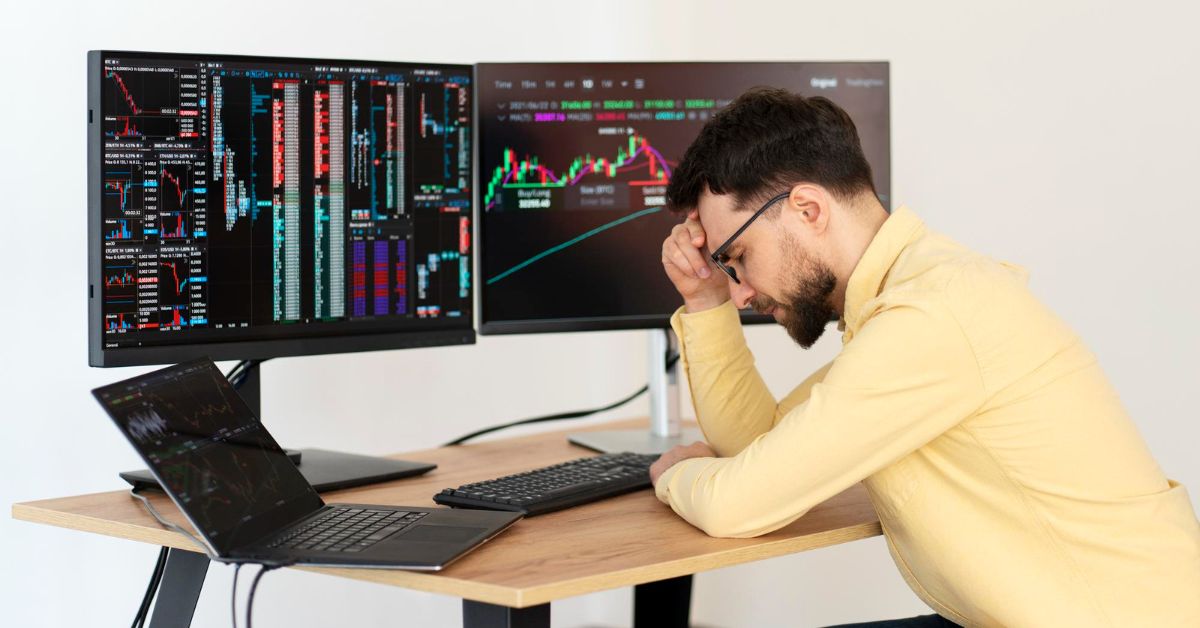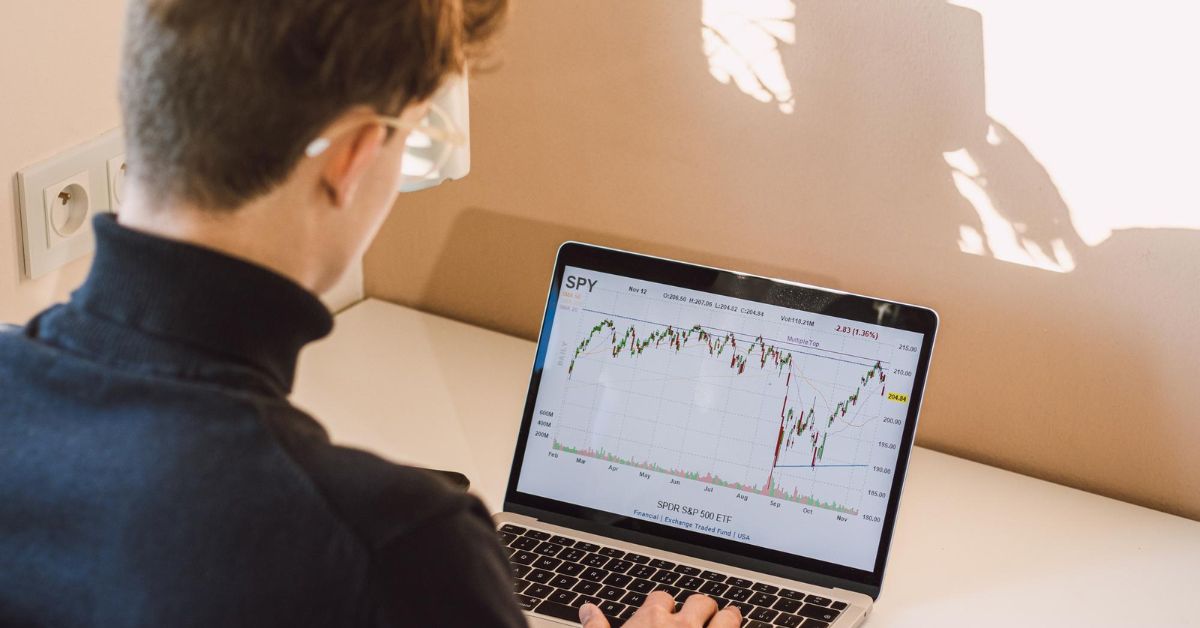Trading can feel like a roller coaster ride. With so many variables and unpredictable market movements, uncertainty is a constant companion. It can cause anxiety, lead to hasty decisions, and affect your trading performance. Traders of all levels need to know how to navigate this uncertainty. So, how do you deal with uncertainty in trading
One of the best ways to handle uncertainty is by using reliable trading platforms like Prime XBT. This platform offers powerful resources and tools that help you make informed decisions. Risk management strategies can be developed by analyzing market data. So, join PrimeXBT today! Use promo code PRIMEOTT to receive a +7% bonus on your deposit.
In this article, we will explore various strategies to deal with uncertainty in trading. You will learn how to build resilience, maintain focus, and adapt your approach. With the right mindset and tools, you can confidently navigate the ups and downs of the trading world.
What is Uncertainty in Trading?

Uncertainty in trading refers to the lack of predictability about future market movements. It can be challenging for traders to know what to expect, which often leads to hesitation and emotional decision-making.
Several factors contribute to uncertainty in trading. Market volatility is a primary source. Prices can change rapidly due to unexpected news or events. Economic news, like employment reports or interest rate changes, also impacts the market. These announcements can create significant price swings, leaving traders uncertain about their next moves.
It’s essential to distinguish between uncertainty and risk. While risk refers to the potential for financial loss, uncertainty encompasses the unpredictable nature of market movements. Understanding this difference helps traders make better decisions. A trader can prepare better for unexpected market conditions if they know the sources of uncertainty.
Navigating uncertainty is the key to successful trading. It helps traders build strategies that account for market unpredictability. With the right mindset, you can learn to manage uncertainty effectively.
The Psychological Impact of Uncertainty
Uncertainty in trading significantly affects trader psychology. Traders often experience strong emotions that can influence their decisions. This emotional turbulence can lead to poor trading choices and increased losses.
Common Emotional Responses
When faced with uncertainty, traders may feel fear or anxiety. Fear of losing money can cause hesitation in making trades. Anxiety often leads to overthinking, which can paralyze decision-making. According to research, nearly 70% of traders report experiencing anxiety at some point in their trading journey.
On the other hand, uncertainty can lead to overconfidence. Some traders may become too sure of their predictions, ignoring signs of risk. This overconfidence can be dangerous. Studies show that overconfident traders are more likely to incur losses, as they may take on larger risks.
Importance of Emotional Intelligence in Trading
Emotional intelligence plays a crucial role in managing the psychological impact of uncertainty. Traders with high emotional intelligence can recognize their feelings and remain calm. This helps them make more rational decisions.
Emotionally intelligent traders are more successful than those without it. It’s easier to get better results if you have emotional intelligence. Techniques such as mindfulness and self-reflection can enhance emotional awareness. When you understand your emotions, you can make better trading decisions, reducing uncertainties.
Overall, addressing the psychological impact of uncertainty is essential for long-term success in trading. Traders should focus on managing their emotions and making informed decisions to effectively navigate market unpredictability.
How do You Deal with Uncertainty in Trading

Managing uncertainty is crucial for traders to achieve long-term success. Here are some effective strategies to help you navigate the unpredictable market landscape.
Develop a Trading Plan
A clear trading strategy is essential for successful trading. Having a well-defined plan helps you stay focused and disciplined.
Key Components of an Effective Trading Plan
- Goals: Set realistic and achievable goals for your trading journey. This could include specific profit targets and timelines.
- Entry and Exit Rules: Define when to enter and exit trades based on specific criteria. This helps reduce emotional decision-making.
- Risk Management: Determine how much capital you are willing to risk on each trade. This is crucial to protect your investment.
- Review Process: Regularly assess your trading performance. Identify what works and what doesn’t to improve your strategy over time.
According to a study, traders with a solid plan are 50% more likely to succeed than those without one.
Use Risk Management Techniques
Risk management is vital in uncertain trading conditions. Implementing strategies to minimize potential losses can safeguard your investments.
Explanation of Stop-Loss Orders and Position Sizing
- Stop-Loss Orders: A stop-loss order automatically sells a security when it reaches a specific price. You can use this effective stop-loss calculator to avoid any trading risk. This helps limit losses in volatile markets. Traders who use stop-loss orders can reduce their losses significantly. Our On Tilt Trading store has a reliable stop-loss calculator for setting optimal stop loss and taking profit levels.
- Pong: Position sizing involves determining how much of your capital to allocate to a particular trade. A common rule is to risk no more than 1-2% of your total capital on a single trade. This strategy helps protect your overall investment. Check out our Position Size Calculator to calculate the ideal position size for your account.
Stay Informed
Staying updated on market news and analysis is crucial for informed trading decisions. Being aware of current events can help you anticipate market movements.
Importance of Keeping Up with Market News
Market news can significantly impact trading outcomes. Economic indicators, geopolitical events, and corporate earnings reports can create uncertainty. For example, a sudden change in interest rates can cause market volatility.
Recommended Rr Market Updates
- News Outlets: Financial news websites like Bloomberg, CNBC, and Reuters provide real-time updates.
- Trading Platforms: Many trading platforms, such as Prime XBT, offer integrated news feeds and analysis tools. Utilizing these resources can give you a competitive edge.
- Social Media: Following industry experts and analysts on platforms like Twitter can also provide valuable insights.
Staying informed can help traders navigate uncertainty and make better decisions. This proactive approach is essential for maintaining confidence in your trading strategy.
Utilizing Technology to Navigate Uncertainty in Trading

In today’s fast-paced trading world, technology can help you manage uncertainty. Leveraging different tools and platforms can enhance trading.
Trading Tools and Software
Trading tools and software provide valuable resources for analysis and market prediction. These tools can help you identify trends and make data-driven decisions.
Overview of Tools for Technical Analysis and Market Prediction
- Charting Software: Tools like TradingView and MetaTrader allow traders to analyze price movements using charts and indicators. These platforms offer customizable features, making it easier to spot patterns.
- Market Scanners: Scanners can filter stocks based on specific criteria, such as volume or price changes. This helps traders identify potential trading opportunities quickly.
Using these tools can improve your analysis skills and reduce uncertainty when making trades. Traders who use advanced technical analysis tools can improve their trading performance.
The Use of Trading Bots and Automated Strategies
Trading bots automate trading based on predefined rules. They can execute trades faster and more efficiently than human traders. You can try the Vestinda trading app. This app helps reduce emotional decision-making by using automated crypto trading strategies tailored to your trading style.
- Benefits of Automated Trading: Automated strategies can help remove emotional decision-making. This leads to more consistent trading results.
- Limitations: Trading bots require careful monitoring. Market conditions can change, and strategies may need adjustments.
Traders using automated strategies have a higher success rate, particularly in volatile markets.
Social Trading Platforms
Social trading platforms offer a unique way to learn from others. These platforms allow traders to follow and copy the strategies of experienced investors.
Benefits of Following Experienced Traders
- Learning Opportunities: Observing skilled traders can give you insight into their strategies and decision-making processes. This can improve your trading skills over time.
- Community Support: Social trading fosters a sense of community among traders. You can share ideas, ask questions, and discuss strategies with others.
Popular social trading platforms include eToro and ZuluTrade. These platforms allow users to see other traders’ performance and make informed choices based on that performance.
Engaging with traders can reduce uncertainty by providing a clearer understanding of market trends and strategies. This collaborative approach can enhance your trading journey.
When to Take a Step Back in Trading

Recognizing when to take a break is essential for any trader. Emotional fatigue and burnout can seriously affect your trading performance.
Recognizing Signs of Emotional Fatigue and Burnout
Emotional fatigue occurs when you feel drained from constant trading pressures. Here are some signs to look out for:
- Constant Irritability: If you get annoyed easily, this could indicate fatigue. Trading should not be a source of constant stress.
- Decreased Motivation: A lack of enthusiasm for trading can be a red flag. If you no longer feel excited about market opportunities, it’s time to reassess.
- Difficulty Concentrating: Struggling to focus on market analysis is another sign. Poor concentration can lead to mistakes and missed opportunities.
- Increased Anxiety: If you feel anxious about your trades, consider taking a break. Anxiety can cloud your judgment and lead to poor decision-making.
Research shows that 60% of traders experience emotional fatigue at some point in their careers. Taking time off can help you recharge and return with a clearer mind.
The Importance of Taking Breaks to Recharge
Taking breaks is crucial for maintaining mental health. Short pauses can improve focus and enhance decision-making. Here’s why breaks matter:
- Preventing Burnout: Regular breaks can help you avoid burnout. This condition can lead to long-term damage to your trading career.
- Enhancing Performance: Many examples show that taking regular breaks can boost performance. A refreshed mind can better analyze markets.
- Promoting Well-Being: Taking time off allows you to focus on your overall well-being. Mental health is just as important as financial health.
Consider scheduling regular breaks throughout your trading routine. Even a few days away from the market can help you gain perspective.
Techniques for Re-entering the Market After a Break
Returning to trading after a break requires a thoughtful approach. Here are some techniques to consider:
- Start Small: Begin with smaller trades to rebuild confidence. This approach allows you to ease back into the market without overwhelming pressure.
- Review Your Strategy: Before diving back in, review your trading plan to ensure that it aligns with your current goals and risk tolerance.
- Set Realistic Goals: Establish achievable goals for your first few trades. This can help you manage expectations and reduce anxiety.
- Monitor Your Emotions: Pay attention to how you feel while trading. If you notice any negative emotions creeping in, consider stepping back again.
A survey found that traders who take planned breaks are more likely to achieve long-term success. Taking a strategic approach to your business will refresh you and prepare you to take on new challenges.
The Role of Community and Support
Joining trading communities and forums can offer numerous benefits. These platforms provide a space to connect with fellow traders. Sharing experiences helps you learn from others’ successes and mistakes. This collective knowledge can lead to better trading decisions. Many traders find encouragement in these communities, which reduces feelings of isolation, and they are a valuable resource when facing uncertainty.
Also, a mentor can provide guidance based on their experiences. They can help you develop a personalized trading strategy and offer emotional support during tough times. This support can be essential for building confidence. Additionally, making distinctions can lead to new insights and perspectives. Collaboration fosters a sense of belonging, which can enhance your trading journey.
FAQ
How to overcome doubt in trading?
Overcoming doubt in trading requires a strategic approach. First, educate yourself about market dynamics and the specific instruments you trade. Confidence can be gained by understanding the factors driving market movements. Establish a trading plan that outlines clear entry and exit strategies. Sticking to this plan minimizes emotional decision-making during volatile conditions.
Utilizing stop-loss orders can also safeguard your investments from unexpected downturns. Regularly reviewing your trades helps identify patterns in your decisions, allowing for adjustments and improvements. Surround yourself with a supportive community or mentor to share experiences and gain insights.
Read More: Should I Take a Break from Trading
Bottom Line
Effectively managing uncertainty in trading is essential for long-term success. The best way to navigate volatile markets is to have a strong trading plan and use effective risk management techniques. Emotional awareness also plays a crucial role in decision-making.
With the right tools, you can take control of your trading journey and make more informed decisions. You can use these strategies to enhance your trading experience and boost your performance.



